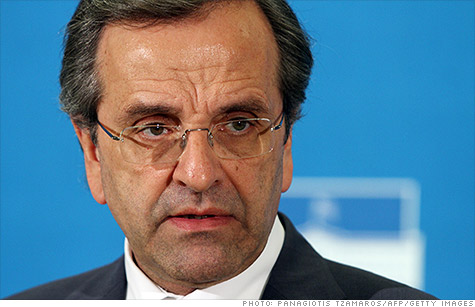Search News

Antonis Samaras, leader of New Democracy, is expected to be sworn in as Greece's next prime minister.
NEW YORK (CNNMoney) -- Greek politicians reached a deal Wednesday to form a new government that promises to uphold the nation's financial commitments, while also seeking to renegotiate its unpopular bailout agreement.
The conservative New Democracy party, which won the most votes in Sunday's election, will form a coalition with the Socialist Pasok party and the smaller Democratic Left party.
New Democracy leader Antonis Samaras was sworn in as Prime Minister Wednesday afternoon in Athens.
The new government takes over at a time when Greece is facing deep political and economic uncertainty.
New Democracy and Pasok both signed off on the bailout agreement Greece struck in March with the nation's international creditors. But the austere terms attached to the emergency funding pushed Greece to the brink of political collapse in May.
Syriza, the far-left political party that rejects austerity, came in second in Sunday's election. Syriza leader Alexis Tsiparis met with Samaras but would not back the coalition.
The New Democracy-led government is now widely expected to renegotiate the terms of the bailout, although it remains committed to honoring the deal and remaining in the euro area.
"The key message of this election is that Greece decided to maintain the European trajectory and to stay in eurozone," said Dimitrios Tsomocos, an Oxford economist and advisor to Samaras.
Tsomocos said the coalition government is committed to the structural reforms Greece must make to restore economic competitiveness.
But he added that New Democracy will work with the Europeans to "modify and enhance" the bailout agreement to include "growth-enhancing policies."
There are signs that the European Union, International Monetary Fund and European Central bank, collectively known as the troika, are willing to make concessions.
In a statement issued Sunday, the Eurogroup of euro area finance ministers said the troika looks forward to an "exchange of views" with the Greek government, once it is formed.
The immediate goal is to give Greece more time to meet its fiscal targets, including a deadline at the end of June to identify additional budget cuts.
However, allowing Greece more time to meet its targets could cause the government to run in arrears, meaning it will go deeper into debt.
In addition, the Greek economy has taken a turn for the worse since the bailout agreement was signed in March.
The combination of weaker-than-expected economic performance and additional debt means Greece could soon need more bailout money.
The government hopes that its focus on boosting economic growth will mitigate any new funding needs by generating new revenue, Tsomocos said.
Analysts at political research firm Eurasia group estimate that Greece could have between €20 billion to €30 billion in additional funding needs, depending on how the terms are restructured.
The renegotiation process is expected to take at least three weeks. But it could take longer depending on how things play out in the Netherlands.
The Dutch government collapsed in April and the nation may not agree to any concessions for Greece until after elections are held in mid-September.
There is a chance that negotiations could drag out until the end of August, when Greece is due to make a €3.1 billion bond payment. But analysts say Greece and the EU would likely find a way to make the payment, possibly through a loan from the eurozone bailout fund.
While there is "quite a bit of wiggle room" to renegotiate the bailout, the process is not going to be easy, said to Nicholas Spiro, director of London-based consultancy Spiro Sovereign Strategy.
"The political haggling between both sides is likely to be drawn-out, messy and could easily be the trigger for the collapse of the government," Spiro wrote in a note to clients.
The Athens Composite (ATH) edged higher, along with the Global X FTSE Greece 20 ETF (GREK). But the National Bank of Greece (NBG), which has surged 70% over the past five days, took the classic 'sell on the news' approach, sliding 6%.
| Index | Last | Change | % Change |
|---|---|---|---|
| Dow | 32,627.97 | -234.33 | -0.71% |
| Nasdaq | 13,215.24 | 99.07 | 0.76% |
| S&P 500 | 3,913.10 | -2.36 | -0.06% |
| Treasuries | 1.73 | 0.00 | 0.12% |
| Company | Price | Change | % Change |
|---|---|---|---|
| Ford Motor Co | 8.29 | 0.05 | 0.61% |
| Advanced Micro Devic... | 54.59 | 0.70 | 1.30% |
| Cisco Systems Inc | 47.49 | -2.44 | -4.89% |
| General Electric Co | 13.00 | -0.16 | -1.22% |
| Kraft Heinz Co | 27.84 | -2.20 | -7.32% |
| Overnight Avg Rate | Latest | Change | Last Week |
|---|---|---|---|
| 30 yr fixed | 3.80% | 3.88% | |
| 15 yr fixed | 3.20% | 3.23% | |
| 5/1 ARM | 3.84% | 3.88% | |
| 30 yr refi | 3.82% | 3.93% | |
| 15 yr refi | 3.20% | 3.23% |
Today's featured rates: